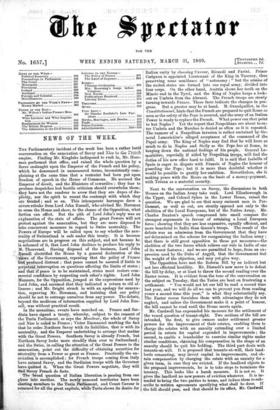NEWS OF THE WEEK.
THE Parliamentary incident of the week has been a rather lurid conversation on the annexation of Savoy and Mee to tire Fr.sr.ch THE Parliamentary incident of the week has been a rather lurid conversation on the annexation of Savoy and Mee to tire Fr.sr.ch empire. Finding Mr. Kinglake indisposed to rush in, Mr. Hors- man performed that office, and raised the whole question by a fierce onslaught upon the Emperor of the French and his policy, which he denounced in unmeasured terms, inconsistently com- plaining at the same time that a restraint had been put upon freedom of speech in the House of Commons. He accused the Emperor of deceit, and the Ministers of cowardice ; they fear to produce despatches lest hostile criticism should overwhelm them; . they have not the candour to avow that they are dupes of du- plicity, nor the spirit to resent the contempt with which they are treated ; and so on. This intemperate harangue drew a severe rebuke from Lord John Russell, who advised Mr. Horsman to cross the House and show, to the shame of the Opposition, what faction can effect. But the pith of Lord John's reply was an explanation of the state of affairs. The great Powers will not protest against the annexation, but they are more disposed to take concurrent measures in regard to Swiss neutrality. The Powers of Europe will be called upon to say whether the neu- trality of Switzerland is safe under this treaty. It is because negotiations are in progress on this subject, and not because he is ashamed of it, that Lord John declines to produce his reply to M. ThouveneL Having disposed of the business, Lord John Russell electrified the House by a general declaration of the views of the Government, repeating that the policy of France had produced distrust ; that peace cannot be assured if liable to perpetual interruption on questions affecting the limits of states ; and that if peace is to be maintained, states must restore com- mercial confidence by respecting each other's rights. Lord John Manners, for the Opposition, jumped at the expressions used by Lord. John, and assumed that they indicated a return to old al- liances; and Mr. Bright struck in with an apology for annexa- tion, reproving Mr. Horsman, and insisting that our policy should be not to estrange ourselves from any power. The debate, beyond the modicum of information supplied by Lord John Rus- sell, was without practical result.
In the meantime, events have marched on. France and Sar- dinia have signed a treaty, whereby, subject to the coasent of
the Turin Parliament, so says the Moniteur, the whole of Savoy and Nice is ceded to France ; Victor Emmanuel marking the fact
that he cedes Northern Savoy with its liabilities, that is with its neutrality, and the Emperor undertaking to arrange that matter with the Great Powers. Southern Savoy is already French, but Northern Savoy looks more steadily than ever to Switzerland ; and the Swiss, in calling the attention of the Great Powers to the annexation, point out the difficulty of obtaining securities for n'eutrality from a Power so great as France. Practically the an- nexation is accomplished ; for French troops coming from Italy have entered Savoy, and the Sardinian troops with the Governor have quitted it. When the Great Powers negotiate, they will find Savoy French de facto. The broad question of Italian liberation is passing from one phase into another. The newly annexed territories have been
electing members to the Turin Parliament, and Count Cavonr is returned for all the great capitals, while Turin shows its desire for I Italian unity by choosing Cavour, Ricasoli and Farini. Prince Carignan is appointed Lieutenant of the King in Tuscany, thus preserving some semblance of " autonomy ; " but the armies of the united states are formed into one royal army, divided into four corps. On the other hand, Austria shows her teeth on the Mincio and in the Tyrol, and the King of Naples keeps a look- out on 'Umbria from the Abruzzi. The French troops are slowly turning towards France. These facts indicate the changes in pro- gress. But a greater may be at hand. M. Grandguillot, in the Constitutionnel, hints that the French are prepared to quit Rome as soon as the safety of the Pope is assured, and the army of an Italian Power is ready to replace the French. What power can that point to but Naples ? Yet the report that Neapolitans are about to en- ter Umbria and the Marches is denied as often as it is repeated. The rumour of a Neapolitan invasion is rather sustained by Ge- neral Lamoriciere's alleged acceptance of the command of the Papal army. The King of Naples may find that he will have as much to do in Naples and Sicily as the Pope has at Rome' in keeping down the national feelings of his people. General La- mOridere, especially if aided by Neapolitan troops, will find the duties oi his new office hard to fulfd. It is said that Isabella of Spain is eager. to dispute with Francis of Naples the honour of guarding the Pope ; but it is more than doubtful whether it would be possible to gratify her ambition. Nevertheless,, she is making peace with the Moors on the basis of a money-payment, with Tetuan as a material security.


























